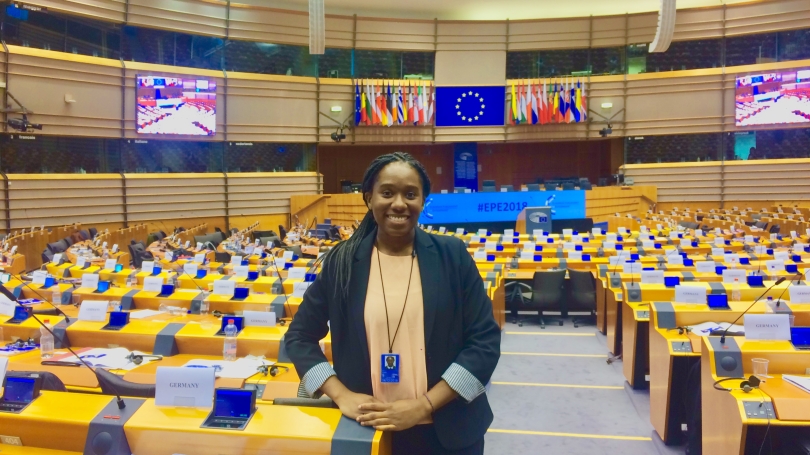
- Public Policy
- Leadership
- Funding
- News & Events
- About the Center
Back to Top Nav
Back to Top Nav
Back to Top Nav
Back to Top Nav
Amelia Ali '19 interned at the European Parliament during the 2018 fall term. The following is an excerpt from her internship report.
This fall, I completed my internship at the European Parliament, the European Union's only directly-elected institution, where its 751 Members of Parliament (MEPs) represent each 28 European member countries. As a Robert Schuman Trainee, I assisted William Legge, who is the Earl of Dartmouth representing the South West England region and Gibraltar as an Independent MEP. He is a member of the Europe of Freedom and Direct Democracy Group (EFDD), and he serves as the EFDD Group Coordinator for the Committee on Economic and Monetary Affairs and the Committee on International Trade.
My main responsibilities were to compile information and data regarding the United Kingdom’s departure from the European Union (Brexit), steps for expediting a successful Brexit transition for small businesses, information championing the United Kingdom’s financial contributions to the EU budget, additional material on member states financial contributions, and the upcoming May 2019 European Parliament elections. I also attended various committee meetings and provided briefs and assessments on forthcoming negotiations between the EU member states and various countries seeking to enter into new free-trade agreements. The relationships between the EU and third countries required tracking parliamentary voting concerning trade, financial services regulation and supervision, and agreement amendments. I supported the Earl by drafting written explanations for his committee votes, speeches, and informational pamphlets for constituents regarding the aforementioned topics.
Moreover, as a Brexit advocate, the Earl needed information analysis about European budget reforms to assess how any extension of the Brexit transition period would require continuing British payments into the EU budget. The United Kingdom’s departure required strategizing its institutional exit for micro-level internal and external measures. These measures include assessing the Parliament’s group representation changes across the member states and their respective domestic parties across the ideological spectrum. This informed me of the political relationships that intersect across ideology, groups, country, and policy.
I observed the efficacy of an international governing body, its effectiveness, its opponents, individual power dynamics, and the fragility of its institution – which highlighted many policy benefits and consequences to me. The insight I gained has supplemented my pursuit of an international legal career concerning information transparency and horizontal accountability both internally and externally. I would like to thank the Rockefeller Center for allowing me to spend my senior fall at the European Parliament, in addition to their guidance in the completion of this internship. I would like to extend my appreciation to the class of 1935’s John Madeleine and the Madeleine family for their support, too. I am extremely grateful for the financial assistance provided to me as it helped make this experience possible.
The Rockefeller Internships Program has funding for Dartmouth undergraduate students to help defray the cost of living expenses associated with a full-time, unpaid, leave-term internships in the fields of public policy, public affairs, and social entrepreneurship.